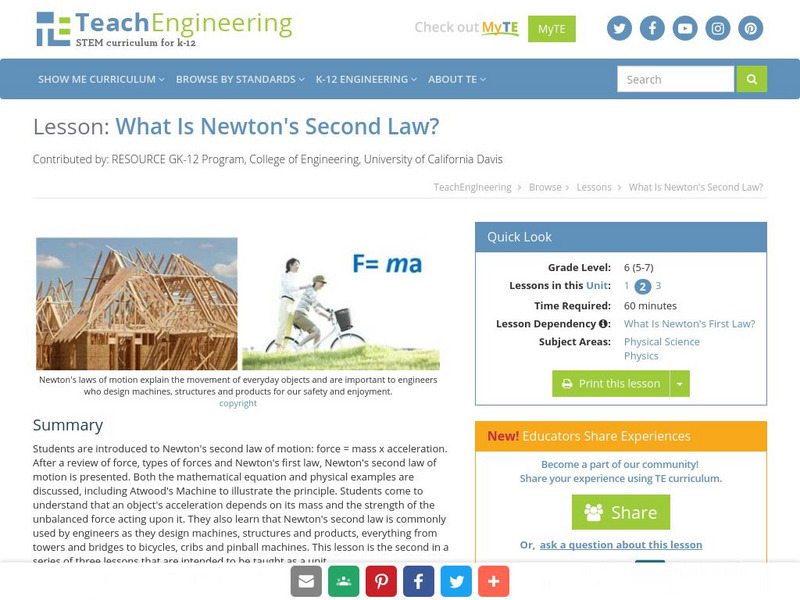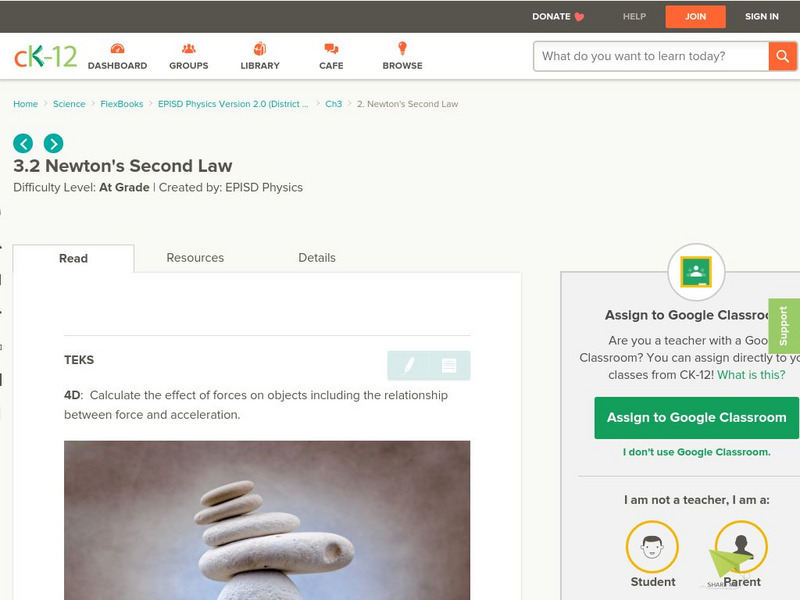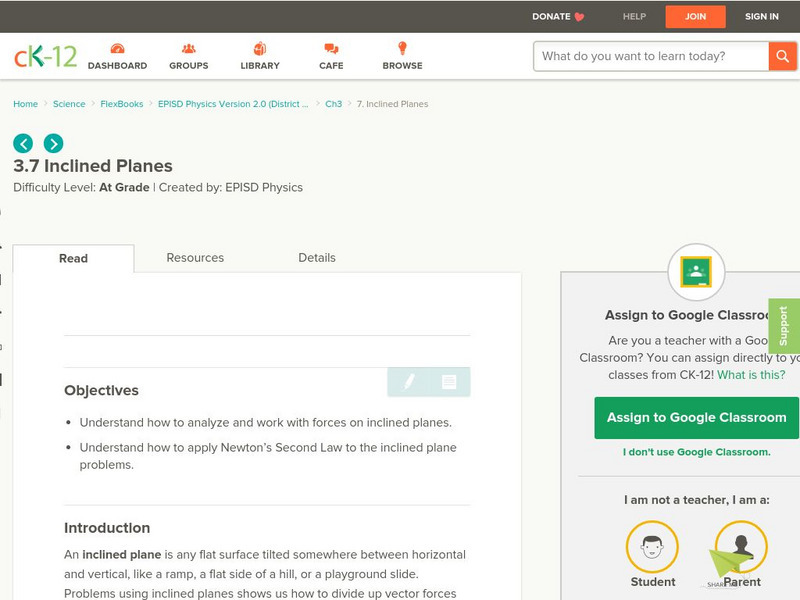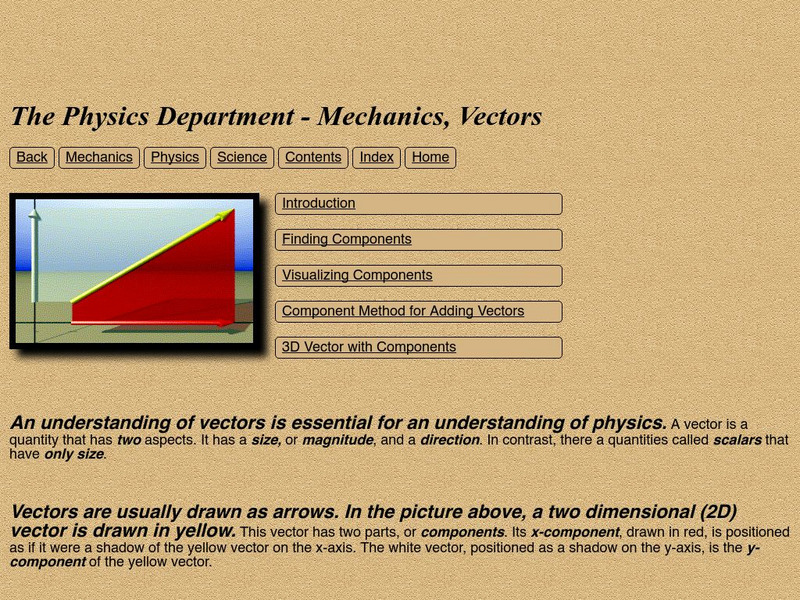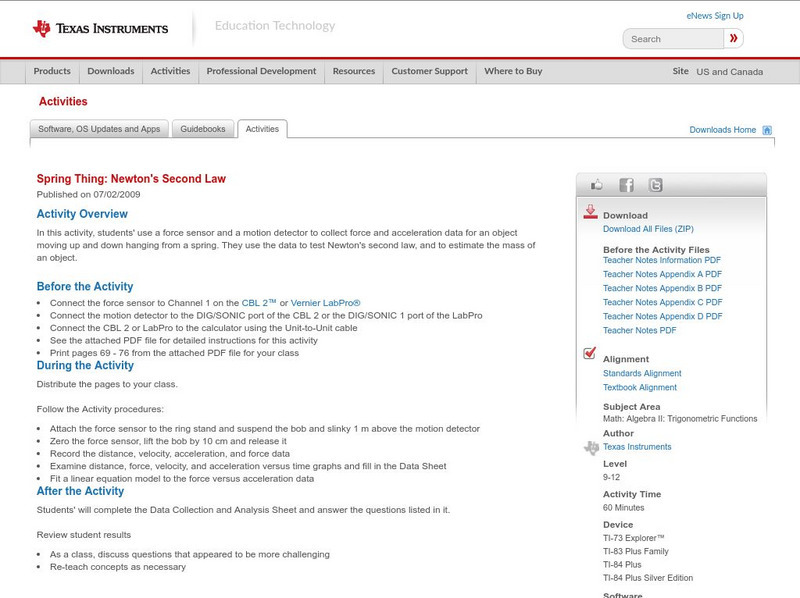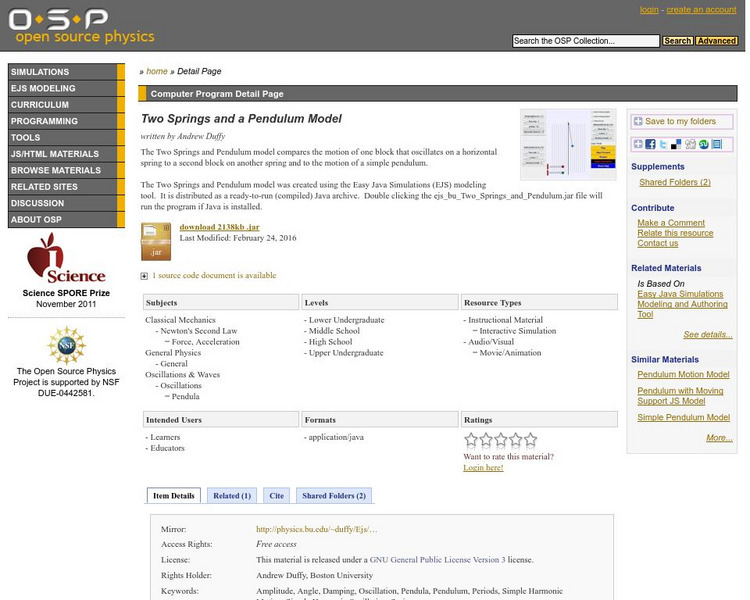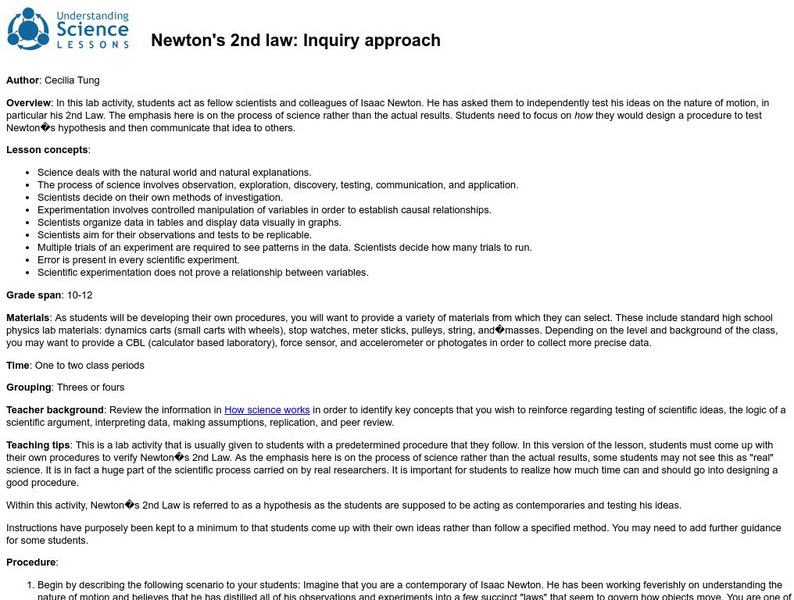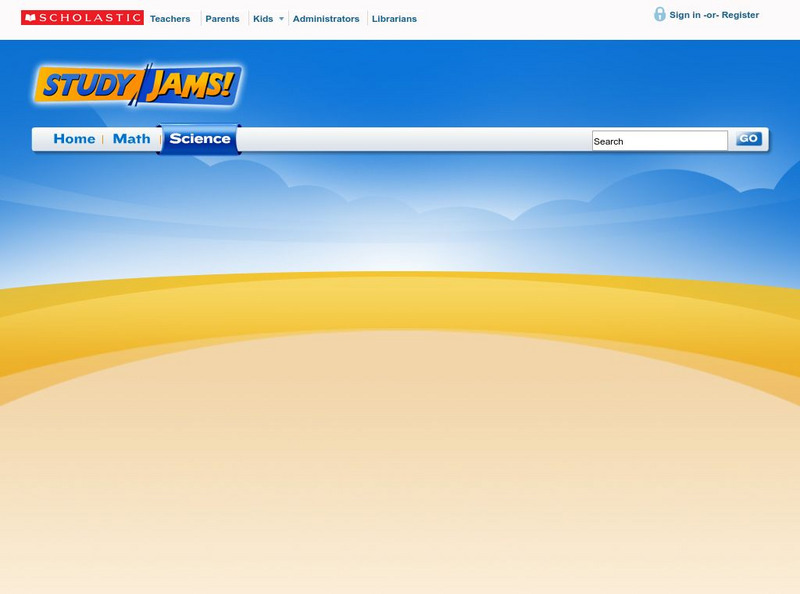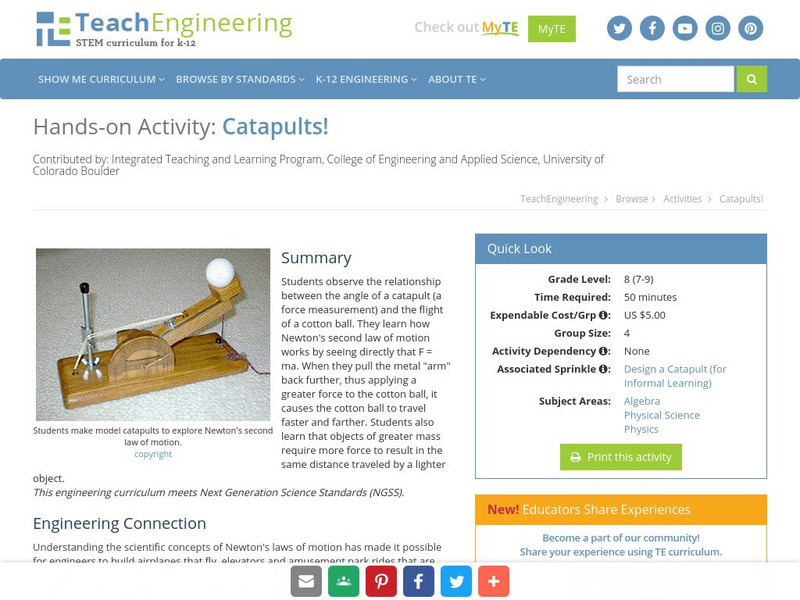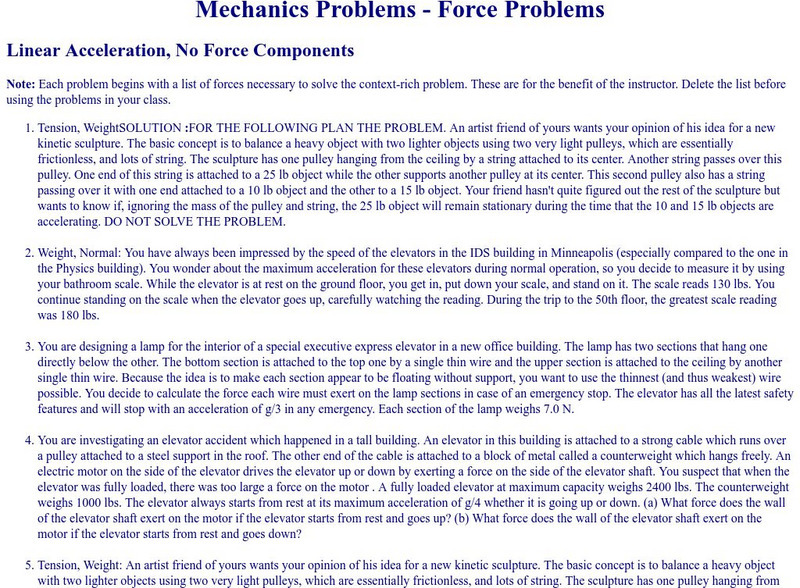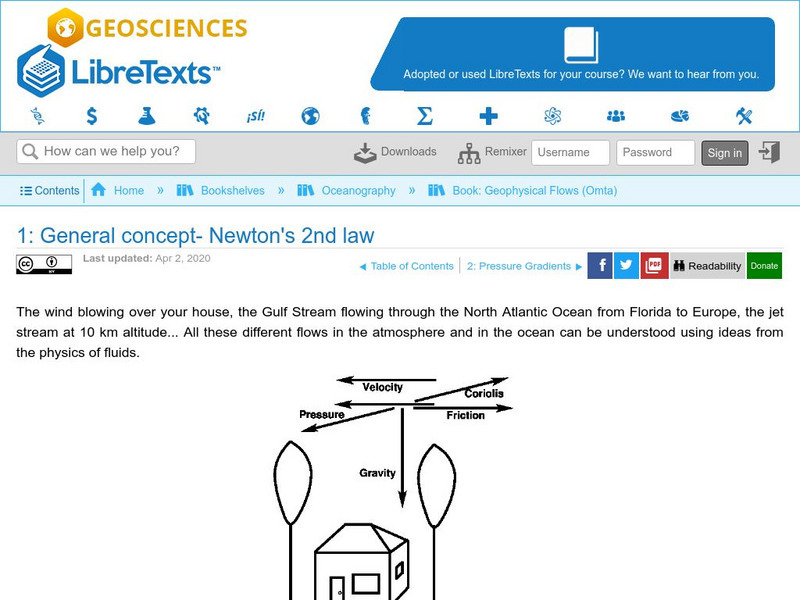TeachEngineering
Teach Engineering: What Is Newton's Second Law?
After a review of force, types of forces, and Newton's first law, students are introduced to Newton's second law of motion: force = mass x acceleration.
TeachEngineering
Teach Engineering: What Is Newton's Third Law?
Young scholars are introduced to Newton's third law of motion, and then learn that engineers apply Newton's third law and an understanding of reaction forces when designing a wide range of creations, from rockets and aircraft to door...
NASA
Nasa: Mass vs. Weight
Several learning modules that explain the difference between mass and weight. Each module includes a video introduction and detailed lesson plan.
CK-12 Foundation
Ck 12: Physics Simulation: Drawbridge
[Free Registration/Login Required] Learn about torque balance in the context of a medieval drawbridge using this interactive simulation. A PDF worksheet and a video tutorial are also available. [3:47]
CK-12 Foundation
Ck 12: Episd: Newton's Second Law
[Free Registration/Login may be required to access all resource tools.] Break down how the relationship between acceleration and mass directly relates to the mass of an object.
CK-12 Foundation
Ck 12: Episd: Inclined Planes
[Free Registration/Login may be required to access all resource tools.] Students will identify how work and force are figured out on inclined planes as well as how to apply Newton's Second Law of Motion to them.
Georgia State University
Georgia State University: Hyper Physics: Rockets
HyperPhysics site with dealing with the mathematics of rocket flight. The site is interactive and allows the user to input data. This is a rather high level site and, while any student could use it to get answers, to understand some of...
Curated OER
Zona Land: Mechanics and Vectors
An exceptional tutorial on the topic of vectors that offers many helpful graphics, some of which are interactive.
University of Guelph
University of Guelph: Physics Tutorials: Torque and Angular Acceleration
Words and equations are used to explain the relationship between angular acceleration and the torque exerted upon an object. Well-written; great graphics.
Texas Instruments
Texas Instruments: Spring Thing: Newton's Second Law
In this activity, students' use a force sensor and a motion detector to collect force and acceleration data for an object moving up and down hanging from a spring. They use the data to test Newton's second law, and to estimate the mass...
Science Education Resource Center at Carleton College
Serc: Com Padre: Will the Egg Break?
In this activity, students investigate why an egg does not break when thrown at a hanging sheet, but does when thrown at a wall. They will learn about momentum, and its applications.
American Association of Physics Teachers
Com Padre Digital Library: Open Source Physics: Two Springs and a Pendulum Model
Swing virtual pendulums and compare the motion of one oscillating weight on a horizontal spring to a second weight on another spring. Then, compare how these motions differ from the motion of a simple pendulum.
University of California
Understanding Science: Newton's 2nd Law: Inquiry Approach Lesson
For this lesson, students develop their own scientific experiment to test Newton's hypothesis that the acceleration of an object depends on the net force acting upon it and its mass. After completing their designed experiment, students...
Scholastic
Scholastic: Study Jams! Science: Forces and Motion: Acceleration
A video and a short quiz on acceleration.
Science Education Resource Center at Carleton College
Serc: Newton's 2nd Law: Inquiry Approach
In this activity, students test Isaac Newton's ideas on the nature of motion, in particular his 2nd Law. The emphasis is on the process of science, investigation, and experimentation, not the results. Students must come up with their own...
TeachEngineering
Teach Engineering: Physics Tug of War
In this activity, students will learn about Newton's 2nd Law of Motion. They will learn that the force required to move a book is proportional to the weight of the book. Engineers use this relationship to determine how much force they...
Physics Classroom
The Physics Classroom: Finding Individual Forces
Explore the world of finding individual forces. "The process of determining the value of the individual forces acting upon an object involve [sic] an application of Newton's Second law and an application of the meaning of the net force."
TeachEngineering
Teach Engineering: Catapults!
Students observe the relationship between the angle of a catapult (a force measurement) and the flight of a cotton ball. They learn how Newton's second law of motion works by seeing directly that F = ma. When they pull the metal "arm"...
University of Minnesota
University of Minnesota: Mechanics Problems: Force Problems
This University of Minnesota site provides a series of contextually rich, real-world problems demonstrating force and Newton's second law of motion.
Libre Text
Libre Text: Pressure Gradients
From high school geography class, you may remember that "air tends to flow from high pressure to low pressure". To understand why this happens, it is key to realizing that gasses (but also liquids) exert a force on their surroundings...
Libre Text
Uc Davis Geo Wiki: Newton's 2nd Law
The wind blowing over your house, the Gulf Stream flowing into the North Atlantic Ocean from Florida to Europe, the jet stream at 10 km altitude. All these different flows in the atmosphere and in the ocean can be understood using ideas...
Physics Classroom
The Physics Classroom: Newton's Second Law of Motion
Learn more about finding acceleration through the practices found in this lesson. "The process of determining the acceleration of an object demands that the mass and the net force are known." Check out this comprehensive site.
CK-12 Foundation
Ck12: Airplane Simulation
[Free Registration/Login Required] In this interactive simulation, the user will be able to control the airplane using Newton's Second Law.
CK-12 Foundation
Ck 12: Physical Science: Newton's Second Law
[Free Registration/Login may be required to access all resource tools.] Newton's second law of motion and the effects of force and mass on acceleration. Direct and inverse relationships between force, mass and acceleration.
